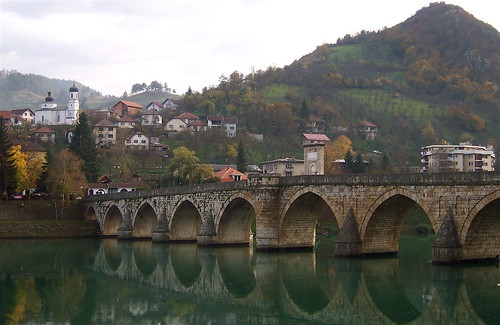The Culture of Lies by Dubravka Ugrešić is a book of essays written between 1991 and 1996 — that is, during and just after the wars that resulted from the collapse of Yugoslavia.* It is my book from Croatia for the Read The World challenge, although there is a slight awkwardness to that choice. This is from the ‘Glossary’ which Ugrešić includes at the back of the book:
Identity:
A few years ago my homeland was confiscated, and, along with it my passport. In exchange I was given a new homeland, far smaller and less comfortable. They handed me a passport, a ‘symbol’ of my new identity. Thousands of people paid for those new ‘identity symbols’ with their lives, thousands were driven out of their homes, scattered, humiliated, deprived of their rights, imprisoned and impoverished. I possess very expensive identity documents. the fact often fills me with horror. And shame.
My passport has not made me a Croat. On the contrary, I am far less that today than I was before.
I am no one. And everyone. In Croatia I shall be a Serb, in Serbia a Croat, in Bulgaria a Turk, in Turkey a Greek, in Greece a Macedonian, in Macedonia a Bulgarian… Being an ethnic ‘bastard’ or ‘schizophrenic’ is my natural choice, I even consider it a sign of mental and moral health. And I know that I am not alone. Violent, stubborn insitence on national identities has provoked a response: today many young citizens of former Yugoslavia, particularly those scattered throughout the world, stubbornly refuse any ethnic labels.
So, although Ugrešić was born in what is now Croatia, and so her book counts for my purposes as a book from Croatia, I should be careful not to label her as a ‘Croat writer’. But then it was never the intention for this challenge that the books and writers chosen should be taken as representative of those countries — or not in a straightforward way. In the context of this challenge, that dynamic between books and countries is quite interesting, but I think it needs a post of its own.
The essays are fascinating. They communicate a sense of an overwhelming cultural trauma, not just because of the war itself but because of the whiplash speed of the changes as all the ex-Yugoslavs created new identities for themselves. Streets were renamed, history rewritten, the literary canon divvied up.
And it wasn’t simply an assertion of a new positive identity for, for example, Croatia, it was necessarily a rejection not just of Serbia and Bosnia but of Yugoslavia. So the country where all of them had lived their whole lives, and which had been an imperfect but functional state for over 80 years, became a ‘prison of nations’, and anyone who questioned this was suffering from the dangerously subversive ‘Yugo-nostalgia’.
This is from the title essay:
I know of a writer colleague who claimed to a foreign journalist that he was ‘the victim of repression’ under Yugo-communism, that his books were banned, and that he had been in prison. That colleague was never in prison nor was he ‘the victim of repression’ and all his books were regularly published. I do not believe that he was lying. Exposed to media brainwashing, terror by forgetting and collective compulsion, my colleague had simply forgotten his personal history, he carried out an unconscious mental touching-up, and in the general context the spoken lie became an acceptable truth. And after all, the foreign journalist had come to hear just such a story, in his Westerner’s head he already carried such a stereotype: the story of a repressed writer in the former communist regime and a happy end in the new, democratic one.
I know of a Zagreb Japanologist who terrorised the whole Yugoslav cultural scene for years with — Japan! Throughout the whole of former Yugoslavia there sprang up haiku circles, haiku poets, ikebana courses, anthologies of Japanese poetry, twinnings between Osaka and Varaždin, festivals of Yugoslav haiku poets. Thanks to the activity of the aforementioned Japanologist, the inflation of haiku poetry during ‘totalitarianism’ had given us all a ‘pain in the neck’. Today the famous Japanologist claims that under the ‘Tito regime’ he was exposed to repression because of … haiku poetry!
We have always been at war with Eastasia.
The essays approach this central subject from various directions — the metaphor of cleanness and cleansing, the relationship between eastern and western Europe, the kitschiness of nationalist aesthetics, pop music — and they are all well-written, thought provoking and rather quotable. But instead of typing out long extracts I’ll just suggest you read it yourself.
Oddly enough, while reading it my mind kept wandering to the possibility of Scottish independence (which, for those who don’t know, is likely to be subject to a referendum sometime soon). In some ways it’s a ridiculous comparison; however the referendum turns out, I’m quite sure it won’t result in civil war and genocide. But there’s something depressing about the idea that after 300 years of the Scots and English managing to live together,† not always harmoniously but not disastrously either, we should have reached a point where we can’t bear to share a national border. And the shift from an intentionally inclusive (if ill-defined) identity like British to narrower, more exclusive, more ethnically specific identities like English or Scottish seems more likely to make us, if anything, more inward-looking and more parochial. But hopefully I’m wrong.
*or at least the first, main phase of those wars; there was the whole Kosovo thing after that.
†yes, I know, the Welsh and [northern] Irish live here too. But somehow I don’t think there are many Scots lobbying for independence because they want to get rid of the Welsh.


